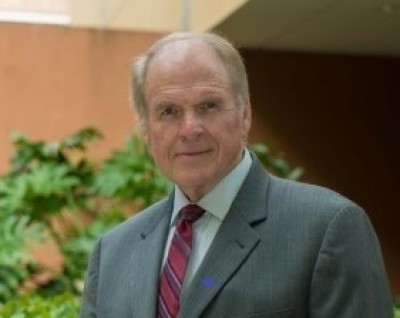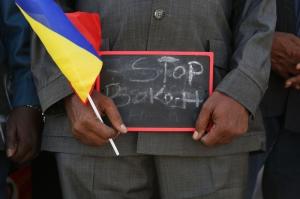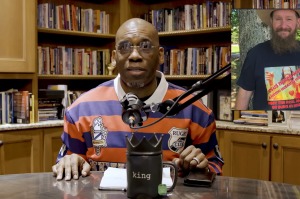Violence and the kingdom quest
“Covid, Cocaine Take Europe to a ‘Breaking Point’,” warned an April 12 headline in Barron’s.[1]

The problem is that people in search of peace amidst the economic and other crises brought on by the pandemic have turned increasingly to drugs. “We are at the breaking point,” said Catherine De Bolle, a European Union official, in an interview with journalist Jan Hennop.
I read those lines while contemplating the United States’ own come-apart.
Desperation grows and leads to cravings for opiates that will bring peace. Governments enact new policies, and the policies petrify into rigid laws that become unyielding fossils — all in the name of protecting the people.
As I brooded on all this, I ran across a saying of Jesus in which the English word, “violence” came up. In Matthew 11 and Luke 16, Jesus and His followers are talking about John the Baptist and his ministry. “From the days of John the Baptist until now the kingdom of heaven suffers violence, and violent men take it by force,” says Jesus. (Matthew 11:12 NASB).
The Greek word translated “violence” is key to understanding Jesus’ statement. As used there it refers, not to physical conflict, but to passionate intensity.
People then and now want desperately the fruit of the Kingdom of Heaven, but without the King of that Kingdom, or the Spirit who energizes that Kingdom.
Thus, across the ages, people have been on the kingdom-quest through which they wear out themselves, their institutions, and even their societies.
My memory is haunted by trips I made into the former Soviet bloc in the period just after the collapse of communism. At one point I helped conduct a leadership conference on ethics that assembled in an aging factory building. Inside, a large wall mural from the Communist era depicted a valiant, energetic Lenin surging forward, clutching the unfurled banner bearing the hammer and sickle as the masses followed with wide-eyed anticipation.
Left-Socialism sought the perfect society that would be the “workers’ paradise.” Right-Fascism strove for what Nazi theoreticians taught would be a world of Wagnerian sweep, with all “inferior” people erased or enslaved.
Twenty years after the Second World War, we lived briefly in Nuremberg, which was to be the world capital of Hitler’s Fourth Reich. On a Sunday afternoon, my wife, baby daughter, and I puttered on the columned marching grounds where Hitler stood before thousands and Goebbels staged his dramatic light shows.
With passionate intensity, every generation has had its utopian dreamers who either die in their obscure corners or bring their nations into their insanity and reduce them to ashes — or, as Allied soldiers said of bombed and shelled Berlin, a “rubble world.”
The tragedy of this exhausting, intensely passionate, often bloody-violent quest is that God never intended for us to create or “bring in” the true Kingdom but receive what He has already created through Christ for His image-bearers — us.
The Bible goes from Paradise to Paradise. Genesis opens with Eden, and Revelation closes with the New Jerusalem. In between, Christ has come into the world to remove the dividing wall of evil that separates us from His holy Kingdom.
Because of His grace, there is no need to try to take it by “force” (Luke 16:16) It is to be received as a gift, its high price already paid by the Lord of history.
The fruit that all the utopians have sought across history, like goodness, justice, peace, and joy that goes beyond mere, transitory, circumstantial happiness, is embedded in the Kingdom of Christ. (See Romans 14:17)
That brings us to the other meaning of the Greek word translated in both Matthew and Luke as “violence,” or “force”. That other word is “eagerness.”
This happens as we realize the differences between entering the Kingdom Christ has already won for us on the immanent scale and building that transcendent Kingdom ourselves. Receiving the Kingdom leads to rest while trying to build it on earth exhausts us.
I discovered how this can work on a national scale while researching my book, Call Down Lightning, about the remarkable revival that swept the United Kingdom country of Wales, 1904-1905. (Thomas Nelson/Emanate, 2019) As the 20th century dawned, Wales, which had experienced mighty spiritual awakenings in earlier times, was plunging into chaos. Pulpits had grown cold, families were collapsing, and society at large was becoming increasingly dysfunctional.
The Holy Spirit moved upon a young coal miner, Evan Roberts, and a few other youths, to launch a national prayer movement. Other authors and I have detailed what happened. Within a year’s time, 100,000 people from a population of about a million, had received Christ. The impact could be felt in society at large as there was a “violent” (in the positive sense) passion to enter Christ’s Kingdom.
Miners even had to retrain the mules that hauled the coal from the mines because the miners had stopped cursing at the animals to get them to move.
The transformation in society soon became national, and eventually international, reaching all the way to California and even North Korea.
Welsh churches were crucial in helping bring this Kingdom fruit to their nation.
So, the “violence of the Kingdom” now must be that of churches fervently praying for the blessings of the Kingdom to fall upon troubled society.
This won’t happen through the “woke church” that allows society to dictate its theology, or the “worldly church” who fashions its styles in the image of its culture, or the “wealth church” that focuses on material acquisition, but through the “awakened church.”
This is where the ministry of the Kingdom starts, and from which its blessings are spread to all.
[1]Covid, Cocaine Take Europe To 'Breaking Point': Europol | Barron's
Wallace B. Henley’s fifty-year career has spanned newspaper journalism, government in both White House and Congress, the church, and academia. He is author or co-author of more than 20 books. He is a teaching pastor at Grace Church, the Woodlands, Texas.



























